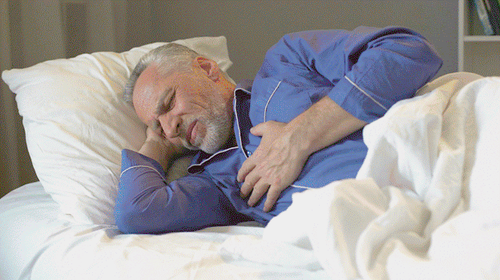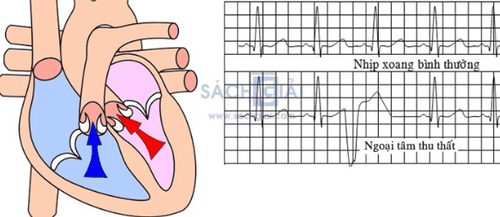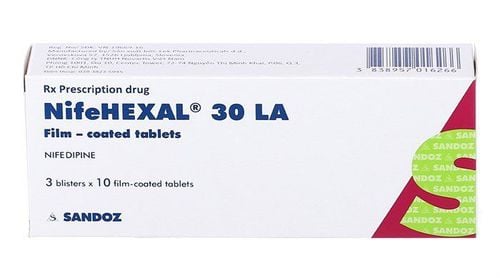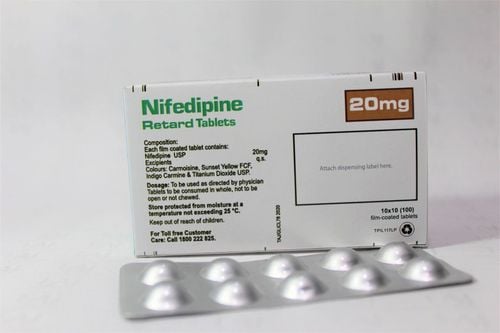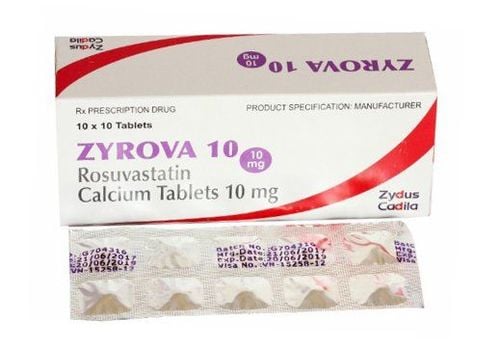This is an automatically translated article.
The article is professionally consulted by Master, Doctor Nguyen Tung Hoanh - Interventional Cardiologist - Department of Resuscitation - Emergency - Vinmec Nha Trang International General Hospital.Ventricular extrasystoles are the most common arrhythmias, which can occur in people with or without heart disease. Evaluation and treatment of ventricular extrasystoles is a challenging and complex issue. The significance and importance of ventricular extrasystoles depend on the clinical setting and underlying cardiac disease.
1. What is ventricular extrasystoles?
Extrasystoles, or ventricular extrasystoles, are defined as an arrhythmia that causes the heart to beat irregularly.
The heart has 4 chambers, two upper chambers (atria) and two lower chambers (ventricles). Cells located in the atria control heart rate by transmitting electrical signals to the ventricles to signal the ventricles to contract and push blood out of the heart to the whole body.
Ventricular extrasystoles are abnormal extra contractions of the ventricles that occur too soon before the atria signal contraction. These heartbeats often do not pump enough blood to supply the body. This condition is called an arrhythmia, which causes the heart to beat irregularly. Abnormal heart rhythm will cause the irregular pulse rhythm to follow.
Trắc nghiệm: Bạn có hiểu đúng về huyết áp cao không?
Huyết áp cao còn được gọi là kẻ giết người thầm lặng vì bệnh thường không có triệu chứng. Thiếu hụt kiến thức về huyết áp cao có thể làm cho tình trạng bệnh trở nên trầm trọng hơn. Dưới đây là những câu hỏi trắc nghiệm vui giúp bạn hiểu đúng về bệnh cao huyết áp.2. Causes of ventricular extrasystoles
Some causes of ventricular extrasystoles are:Change or imbalance of electrolytes in the body. The level of adrenaline in the body increases excessively due to exercise, anxiety or the use of products containing caffeine. Damage to the heart muscle from coronary artery disease, congenital heart disease, high blood pressure, or infection (myocarditis). Effects of certain drugs. Ventricular extrasystoles are common in all ages, most commonly in the 50-70 age range, and the incidence is higher in men than in women.
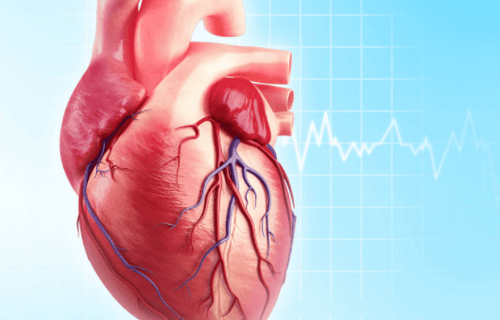
Ngoại tâm thu thất là tình trạng rối loạn nhịp tim làm cho tim đập không đều.
3. Symptoms of ventricular extrasystoles
A feeling of tightness in the chest, as if the heart stopped beating or skipped a beat. Heart palpitations, palpitations, accompanied by palpitations. There may be a fluttering or pounding sensation in the chest, and may spread to the throat or neck. Ventricular extrasystoles are often felt most clearly at rest, because then there are no other factors affecting heart rate.

Nhịp ngoại tâm thu thất thường được cảm nhận rõ ràng nhất là khi nghỉ ngơi
4. Is ventricular extrasystoles dangerous or not?
Mild ventricular extrasystoles: These are rare, rare extrasystoles, especially atrial extrasystoles in young people, without any other heart disease. In these cases, it is only necessary to change the lifestyle in a positive way, quit stimulants such as tobacco, alcohol, live in moderation, keep a comfortable spirit...
Severe ventricular extrasystoles: Ventricular extrasystoles appear thickened as double ventricular presystole (a normal rhythm accompanied by an extrasystolic beat) third ventricular extrasystoles (2 normal beats accompanied by one extrasystolic beat), or more severe extrasystoles thick, clustered, multifocal... making patients often tired, palpitations, shortness of breath... At that time, even though there was no physical damage to the heart disease, the patient still had to take one of the antipsychotic drugs. rhythm. This is a very difficult drug to use, causing many side effects, so absolutely do not use it arbitrarily.
Ventricular extrasystoles occur on the background of other diseases: Most are serious heart diseases such as myocardial infarction, congenital heart disease, myocarditis, heart failure, valvular disease, or on the background of non-cardiac conditions such as anemia , hyperthyroidism, hypokalemia... At that time, it is necessary to use many other drugs to support the treatment of these diseases, while the treatment of ventricular extrasystoles is only a part of supporting the treatment of these diseases.
5. Treatment of ventricular extrasystoles
Healthy individuals with mild, non-threatening ventricular extrasystoles may be treated with antiarrhythmic drugs and electrolytes.
People with cardiovascular disease have ventricular extrasystoles, early treatment will help avoid the risk of sudden death:
Treat the cause if detected early. In the case of drug use, ventricular extrasystoles decrease or disappear, but stopping the drug recurs again, long-term use of drugs or high doses of drugs may cause side effects, so electrocautery intervention should be considered. heart. If the ventricular extrasystoles are thickened, appear in clusters of three, clusters of four or have dangerous tachycardia episodes, in addition to using drugs, it is also necessary to actively intervene by burning the arrhythmia through the electrode wire. Carotid sinus massage can increase or decrease the appearance of extrasystoles. Most patients do not require specific treatment unless it is life-threatening or severe symptoms. Antiarrhythmic drugs have many side effects, especially the ability to cause arrhythmias and decrease ventricular function. Therefore, it is necessary to consult a cardiologist for advice and appropriate medication prescription.
In cases of severe ventricular extrasystoles or unresponsive to drug therapy, you may have an electrocardiogram. This is a method of using high-energy waves to burn areas of the heart that cause disturbances in the electrical signals of the heart, and is an effective method in the treatment of arrhythmias and ventricular extrasystoles.
Ths.BS. Nguyen Tung Hoanh has experience and strength in Cardiovascular Resuscitation - Emergency: Hypertension, Peripheral Vascular Diseases, acute and chronic coronary artery diseases, ..in addition, the doctor also treats other diseases. Comorbidities such as: Diabetes, Hyperthyroidism, Hypothyroidism, Kidney diseases, respiratory diseases, etc. Currently, Dr. Hoanh is an interventional cardiologist at the Department of Resuscitation - Emergency - Vinmec Nha Trang International General Hospital.
Please dial HOTLINE for more information or register for an appointment HERE. Download MyVinmec app to make appointments faster and to manage your bookings easily.




